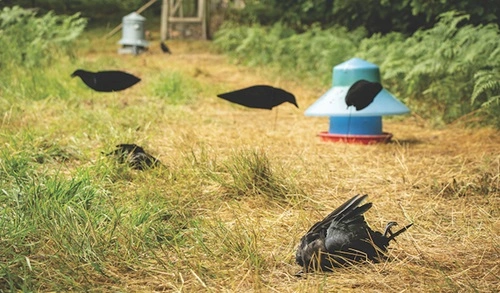Yes, shooting crows is illegal in many circumstances, but there are exceptions under federal and state regulations. Crows are protected under the Migratory Bird Treaty Act (MBTA), but the law provides certain allowances for controlling their populations, particularly if they are causing damage to crops or property. Specific hunting seasons and regulations vary by state, and failure to comply with these rules can lead to penalties.
Federal Protection Under the Migratory Bird Treaty Act (MBTA)
1. Crows and the MBTA
The MBTA protects crows as migratory birds, prohibiting their killing, capture, or harm without authorization. However, crows have a unique status under the MBTA, allowing for limited hunting and population control measures under specific conditions.
2. Depredation Exceptions
- Landowners may kill crows without a permit if they are:
- Damaging crops, livestock, or property.
- Posing health or safety hazards.
- These actions must comply with federal and state guidelines, which often require the use of humane methods or non-lethal deterrents before resorting to shooting.
State Regulations for Crow Hunting
1. Hunting Seasons
- Most states establish regulated hunting seasons for crows, typically outside their breeding period. For example:
- California: Crow hunting is allowed during designated seasons, but hunters must follow bag limits and weapon restrictions.
- Texas: Crows can be hunted year-round if they are damaging crops or property.
2. Licensing Requirements
- A hunting license is often required to shoot crows during the legal hunting season.
- Some states may require additional permits for population control outside the hunting season.
3. Weapons Restrictions
- The use of firearms or pellet guns for shooting crows must comply with state and local laws. Many municipalities restrict firearm discharge within city limits.
Ethical and Legal Considerations
1. Non-Lethal Alternatives
- Before shooting crows, consider non-lethal methods such as scare devices, bird netting, or reflective deterrents.
- These methods are often required as a first step under federal and state regulations.
2. Impact on Ecosystem
- Crows play an essential role in the ecosystem by controlling pests and cleaning up carrion. Over-hunting can disrupt local biodiversity.
3. Animal Cruelty Laws
- Even when legal, shooting crows must be done humanely. Intentionally causing unnecessary suffering can lead to animal cruelty charges.
Legal Consequences for Shooting Crows Illegally
1. Fines and Penalties
- Violating the MBTA can result in fines of up to $5,000 for individuals and even higher penalties for organizations.
- State fines for hunting outside designated seasons or without a license range from $50 to $1,000.
2. Criminal Charges
- Intentional violations, such as shooting crows without justification or in restricted areas, may lead to misdemeanor or felony charges.
3. Confiscation of Equipment
- Firearms or other equipment used in illegal activities may be confiscated by law enforcement.
Related FAQs
Q1. Can I shoot crows on my property?
Ans: Yes, but only under specific conditions. Crows can be shot if they are causing damage or posing a threat, but state and local laws must be followed.
Q2. Do I need a hunting license to shoot crows?
Ans: In most cases, yes. A valid hunting license is required to hunt crows during the designated hunting season.
Q3. Are there any restrictions on shooting crows in urban areas?
Ans: Many cities and towns prohibit the discharge of firearms, even for pest control. Check local ordinances before taking any action.
Q4. Are crows protected under federal law?
Ans: Yes, crows are protected under the MBTA, but the law provides exceptions for population control and damage prevention.
Q5. What are the penalties for shooting crows illegally?
Ans: Penalties include fines, potential jail time, and the confiscation of equipment used in the violation.
Conclusion
Shooting crows is governed by a complex mix of federal, state, and local laws. While exceptions exist for population control and damage prevention, it is essential to follow legal hunting seasons, licensing requirements, and humane practices. Non-lethal methods are encouraged and often required as a first step. Understanding the rules ensures compliance while maintaining ethical and ecological balance.


